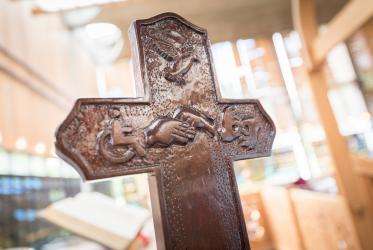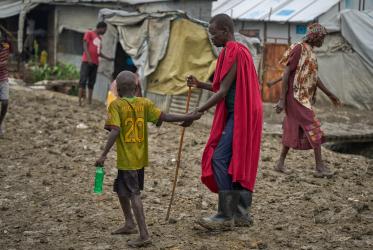"I have learned to see everyone infected as a brother, a sister, a niece, a nephew - a close relative," said Samuel Kobia this afternoon in Bern. The World Council of Churches (WCC) general secretary was speaking at an ecumenical event for World AIDS Day held outside the Swiss parliament.
Emphasizing that "Africa needs medicines. Now!", participants presented 27,000 petitions addressed to the Swiss government, pharmaceutical industry and churches, calling on them to make a greater effort to ensure access to anti-retroviral treatment to African populations.
In a public interview that was part of the programme, Kobia explained that having lost several of his close relatives to the disease, he has learned to relate "more personally" to people affected by the epidemic. "However, this epidemic goes way beyond any personal tragedy," he said.
While commending the Swiss government for its current commitments in this regard, Kobia also expressed his hope and prayer that it will "scale up its support for action against HIV ands AIDS worldwide".
Regarding the role of the pharmaceutical industry, Kobia recognized that "profits are a key component that brings more resources for more research," but nevertheless appealed to the industry: "when it comes to HIV and AIDS, don't put profit before life".
According to Kobia, the epidemic has revealed the "great resilience and tenacity" of suffering people. They, as well as vulnerable communities "should not be perceived as passive recipients of handouts and help," but as "co-workers" in the struggle to overcome the epidemic and "the fundamental flaws in our societies which make us all vulnerable".
Churches in particular need to "correct the flawed theology and practices that equate sin with disease" and that put "morality over compassion," Kobia said. Although recognizing that "distributing condoms in churches may not be the best approach," he fully supports "any preventive method which is scientifically proven to be effective" to avoid HIV transmission.
Kobia also advocates the promotion of dialogue on questions related to AIDS and sexuality. "One of the greatest difficulties for churches in dealing with the issue of HIV and AIDS has been our inability to address sexuality in a frank and forthright manner," he said.
The WCC general secretary expressed "appreciation and gratitude" to the churches in Switzerland for their support for Africa. "I believe your initiative today will bring the message - to make treatment more accessible for all - closer to everyone's heart and mind", he said.
Speaking on behalf of the Swiss Federation of Protestant Churches (FEPS), its president Rev. Thomas Wipf reported on a positive response to the campaign "Africa needs medicines. Now!" " We are pursuing our commitment via our programmes," he said.
For his part, Catholic Bishop Amédée Grab stated that Switzerland "must nevertheless do a great deal more in the prevention and treatment of pandemics".
The event, which included the lighting of 8000 candles laid out in the shape of Africa, and the petition campaign were jointly organized by the Bethlehem Mission Immensee and Swiss Interchurch Aid (EPER).
The full text of Samuel Kobia's comments is available at:
wcc-coe.org/wcc/what/mission/ehaia-kobia-interview.html [English]
Additional information:






